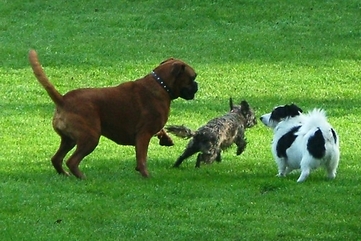 “This isn’t a game.” I turn from my puppy, who is straining his leash to dark at squirrels and falling leaves, to see the speaker. He’s on a rise in the park, above the service road. His words are the first human speech I’ve heard since I left my house this morning, so they could qualify as a kledon, an oracle prized by the ancient Greeks that delivers its message through a chance phrase coming out of silence or white noise. Yesterday, I found the oracle at work at a breakfast buffet. Today, perhaps, at the dog park.
“This isn’t a game.” I turn from my puppy, who is straining his leash to dark at squirrels and falling leaves, to see the speaker. He’s on a rise in the park, above the service road. His words are the first human speech I’ve heard since I left my house this morning, so they could qualify as a kledon, an oracle prized by the ancient Greeks that delivers its message through a chance phrase coming out of silence or white noise. Yesterday, I found the oracle at work at a breakfast buffet. Today, perhaps, at the dog park.
What does it mean, to say that something isn’t a game? Generally, when we say that, we mean that we regard an issue as very serious. Yet ironically, game players get very serious about the games they play, whether the game is Second Life or golf or serial dating or rehearsing in a bunker for World War III. Games typically involve an edge of competition. As Stephen Nachmanovitch argues elegantly in his book Free Play, approaching something as a rule-bound contest in which there are winners and losers can be antithetical to the spirit of playing for the sake of play that is both the magic of childhood and the condition for the creative act.
I drift closer to the dog park speaker to see if I can glean more about what he means. “You gotta do what you gotta do,” he is now insisting. “See, when I was very young I learned to see myself as a theme or an animal, instead of the slave of some ideology or concept. I need water and food. I guess I don’t need the vodka.”
I notice the burr in his voice and the stubble on his chin, and decide that this is hangover philosophy and I probably don’t need to linger for any more, though I recall that a bishop of Rome (Ambrose) told an Emperor (Theodosius) that God may speak even through drunkards, especially in dreams.
I walk on with my dogs, beside the lake. The puppy, who is not yet five months old, is bounding ahead. The old guy, who is nearly fourteen and arthritic, is dragging behind, taking four times longer to sniff everything than he used to need, because his sense of smell is failing. “A dawdler and a frisky one,” comments a smiling fellow out for his morning constitutional. Looking at the moving cameo we make through his eyes, I am reminded of Plato’s metaphor of the charioteer of the soul, who is forever trying to manage two horses, one of which seeks the heights, while the other wants to plunge down into lower places. I think, too, of how the dawdler and the frisky guy in me contend when it comes to getting just about anything done.
I tug on the leashes to repoint my dogs towards the humped footbridge over the lake. There is a MISSING sign glued to a post. Dante is missing. There’s a picture of a cute husky puppy lying on his side, his tongue lolling. My mind goes to the original Dante, who went missing for a long time, after he found himself lost in a dark wood in mid-life, and then had to traverse all the cycles of hell before he earned the right to meet his radiant guide inside the mountain of Purgatory. In the Purgatorio, when Dante meets the beloved of his soul in the guise of the beautiful woman he loved and lost – but with the savage splendor of the griffin shining in her eyes – she rebukes him for having gone missing for so many years before he was definitively lost. “For so many years I sought you in dreams,” she tells him, “and you would not listen or remember.”
We cross the bridge. There are ducks on the water, and a lone man fishing. As we turn homeward, the sun is in my eyes. It is white-gold in a heron-blue sky. Below the sun, stratus clouds lie across the rim of the world like immense white quills. Time to write.
Doggie games photo by Elsie esq via flickr
-thumb-154x200-18378.jpg)
